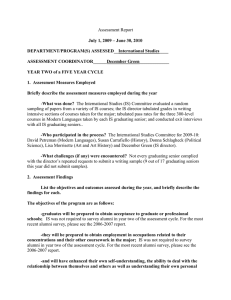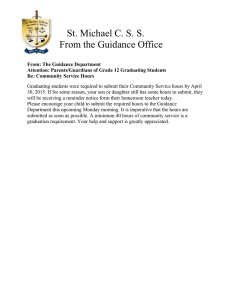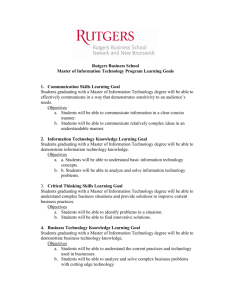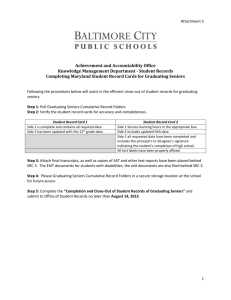International Studies (B.A.)
advertisement
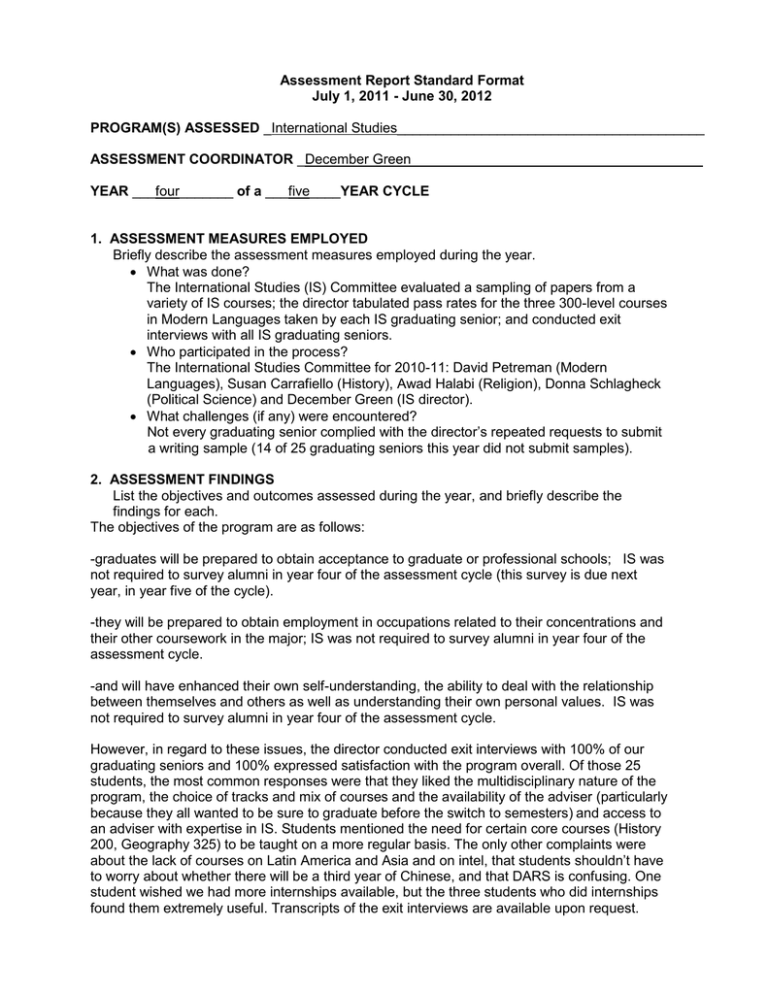
Assessment Report Standard Format July 1, 2011 - June 30, 2012 PROGRAM(S) ASSESSED _International Studies________________________________________ ASSESSMENT COORDINATOR _December Green______________________________________ YEAR ___four_______ of a ___five____YEAR CYCLE 1. ASSESSMENT MEASURES EMPLOYED Briefly describe the assessment measures employed during the year. What was done? The International Studies (IS) Committee evaluated a sampling of papers from a variety of IS courses; the director tabulated pass rates for the three 300-level courses in Modern Languages taken by each IS graduating senior; and conducted exit interviews with all IS graduating seniors. Who participated in the process? The International Studies Committee for 2010-11: David Petreman (Modern Languages), Susan Carrafiello (History), Awad Halabi (Religion), Donna Schlagheck (Political Science) and December Green (IS director). What challenges (if any) were encountered? Not every graduating senior complied with the director’s repeated requests to submit a writing sample (14 of 25 graduating seniors this year did not submit samples). 2. ASSESSMENT FINDINGS List the objectives and outcomes assessed during the year, and briefly describe the findings for each. The objectives of the program are as follows: -graduates will be prepared to obtain acceptance to graduate or professional schools; IS was not required to survey alumni in year four of the assessment cycle (this survey is due next year, in year five of the cycle). -they will be prepared to obtain employment in occupations related to their concentrations and their other coursework in the major; IS was not required to survey alumni in year four of the assessment cycle. -and will have enhanced their own self-understanding, the ability to deal with the relationship between themselves and others as well as understanding their own personal values. IS was not required to survey alumni in year four of the assessment cycle. However, in regard to these issues, the director conducted exit interviews with 100% of our graduating seniors and 100% expressed satisfaction with the program overall. Of those 25 students, the most common responses were that they liked the multidisciplinary nature of the program, the choice of tracks and mix of courses and the availability of the adviser (particularly because they all wanted to be sure to graduate before the switch to semesters) and access to an adviser with expertise in IS. Students mentioned the need for certain core courses (History 200, Geography 325) to be taught on a more regular basis. The only other complaints were about the lack of courses on Latin America and Asia and on intel, that students shouldn’t have to worry about whether there will be a third year of Chinese, and that DARS is confusing. One student wished we had more internships available, but the three students who did internships found them extremely useful. Transcripts of the exit interviews are available upon request. The learning outcomes are as follows: -graduates will attain proficiency in a second language; Based on pass rates, 100% of our graduating seniors for the year surveyed did attain proficiency in a second language. - will demonstrate themselves to be capable of conducting independent research and have effective research skills, including proper reference citation in bibliographies and footnotes; The evidence from the writing samples suggests a moderate to high success rate in terms meeting our goals concerning writing, research, critical thinking and problem-solving skills. For example, of the eleven papers submitted, eight passed on all four measures. One paper was deemed not applicable (because it was a white paper for the Model United Nations, not a research paper). One paper failed on all four measures and one paper failed on three of the four measures. - have strong critical thinking and problem-solving skills; and will be effective writers; Please see above. 3. RESPONSE TO ASSESSMENT FINDINGS List planned or actual changes (if any) to curriculum, teaching methods, facilities, or services that are in response to the assessment findings. This year’s evidence suggests that the International Studies program is meeting its goals. 4. ASSESSMENT ACTIVITIES FOR COMING YEAR Briefly describe the learning outcomes to be assessed during the upcoming year and the measures that will be used to assess them. In addition to the learning outcomes and measures listed above, next year IS will be due for an alumni survey to assess whether graduates are prepared to obtain acceptance to graduate or professional schools; whether they are prepared to obtain employment in occupations related to their concentrations and their other coursework in the major; and if they consider that their IS degree enhanced their own self-understanding and relations with others. 5. UNIVERSITY LEARNING OUTCOME ASSESSMENT As part of the HLC Academy project, each program of study will eventually assess two University Learning Outcomes in required courses in the major. One outcome will be assessed in 2014-15, and the second will be added in 2015-16. Identify the two ULOs that will be assessed and, if possible, the likely course(s) to be used. Although the professors teaching these courses were not unanimous on which two ULOs to use, they did agree on number 5: demonstrate global and multicultural competence. Assoc. Dean Loranger advised that the IS Committee decide on the other ULO, and the majority agreed on number 6: demonstrate understanding of contemporary social and ethical issues. Please note that this ULO may not be appropriate for all the IS core courses (those likely to be assessed on one or both of these ULOs). The courses are: ART 2140, EC 2500, CST 2320, GEO 3300, HST 3900, PLS 2220, and WMS 2000. University Learning Outcomes: Wright State graduates will be able to: 1. communicate effectively 2. demonstrate mathematical literacy 3. evaluate arguments and evidence critically 4. apply the methods of inquiry of the natural sciences, social sciences, and the arts and humanities 5. demonstrate global and multicultural competence 6. demonstrate understanding of contemporary social and ethical issues 7. participate in democratic society as informed and civically engaged citizens

